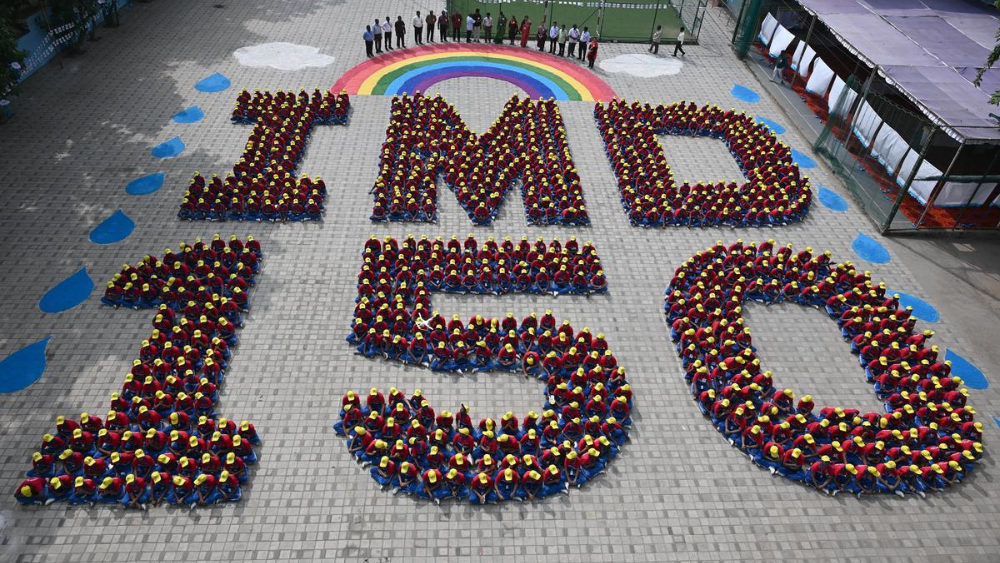“Celebrate 150 years of IMD with the ‘Undivided India’ seminar, fostering regional unity and honoring a shared legacy.”
Table of Contents
In an extraordinary effort to foster regional unity, India has extended invitations to Pakistan, Bangladesh, and other South Asian nations to participate in a seminar celebrating the 150th anniversary of the India Meteorological Department (IMD). The event, themed “Undivided India,” aims to reflect on a shared history that transcends modern political boundaries. Pakistan has already confirmed its participation, while Bangladesh’s response is eagerly awaited.
This historic gathering is more than just a commemoration of the IMD’s legacy; it is a significant step toward regional cooperation in science, culture, and climate resilience.
The Concept of ‘Undivided India’
Historical Context of the Subcontinent
Before the partition of 1947, the Indian subcontinent functioned as a cohesive cultural and geographical entity. Institutions like the IMD were established to serve the collective needs of the region, without regard to the borders that divide it today.
Shared Heritage and Scientific Collaboration
The IMD’s foundation in 1875 marked a new era in scientific advancement, with meteorology playing a crucial role in agriculture, disaster management, and trade. This seminar serves as a reminder of the interconnectedness of the subcontinent’s past and its potential for a collaborative future.

150 Years of IMD: A Legacy of Excellence
Early Meteorological Efforts
The Role of British Observatories
The British East India Company laid the groundwork for meteorology in the region by establishing observatories in Calcutta (1785), Madras (1796), and Bombay (1826). These institutions collected vital weather data, paving the way for a centralized organization.
Events Leading to IMD’s Establishment
A series of natural disasters, including the 1864 cyclone in Calcutta and severe monsoon failures, highlighted the need for systematic weather monitoring. The British administration responded by creating the India Meteorological Department in 1875.

IMD’s Modern-Day Contributions
Technological Milestones
Over the years, the IMD has embraced technological advancements, transitioning from telegrams to sophisticated satellites. Its collaboration with the Indian Space Research Organisation (ISRO) revolutionized weather forecasting through geostationary satellites like INSAT, which provide real-time data.
Disaster Management and Forecasting
Today, the IMD is a cornerstone of India’s disaster management efforts, issuing timely warnings that save lives during cyclones, floods, and other extreme weather events.
Regional Participation: A Step Toward Unity
Pakistan’s Confirmation and Its Implications
Pakistan’s decision to participate is a significant gesture of goodwill, showcasing the potential for regional collaboration despite political tensions. This move not only highlights a shared history but also sets the stage for meaningful dialogue and cooperation.
Awaiting Bangladesh’s Response
While Bangladesh’s response is still awaited, its participation could further strengthen the event’s vision of unity. Officials remain optimistic about Dhaka’s involvement in this historic seminar.
Government’s Commemorative Efforts
To mark this milestone, the Indian government has launched various initiatives to ensure the event’s success.
Special Coin Release
A limited-edition Rs 150 coin will be released to honor the IMD’s 150-year journey and its contributions to meteorology.
Republic Day Tableau
A special tableau featuring IMD’s achievements will be showcased during the Republic Day parade, emphasizing the department’s role in shaping the nation’s progress.

Collaborative Challenges and Opportunities
Addressing Climate Change
As climate change continues to pose significant threats, this seminar highlights the need for regional collaboration in tackling shared challenges like extreme weather, rising temperatures, and resource management.
Fostering Regional Partnerships
Beyond meteorology, the event symbolizes the importance of scientific and cultural partnerships. Such collaborations are essential for building a sustainable and resilient future for the subcontinent.
Conclusion
The 150th anniversary of the India Meteorological Department is not just a celebration of its legacy but also a call for unity across South Asia. By inviting neighboring countries, India is fostering a spirit of cooperation rooted in shared history and common challenges.
This historic event underscores the importance of regional collaboration in addressing global issues like climate change and disaster management. It serves as a powerful reminder that progress is most effective when achieved together.
FAQ’S
What is the ‘Undivided India’ seminar about?
The seminar commemorates the 150th anniversary of the India Meteorological Department (IMD) and highlights the shared history of South Asian nations before partition.
Which countries are invited to the seminar?
India has invited Pakistan, Bangladesh, Bhutan, Afghanistan, Myanmar, Maldives, Sri Lanka, and Nepal, along with officials from the Middle East, Central Asia, and Southwest Asia.
Why is Pakistan’s participation significant?
Pakistan’s confirmation signifies a step toward regional collaboration, emphasizing shared heritage despite political differences.
What is the role of the IMD today?
The IMD provides critical weather forecasting, disaster management support, and climate research, serving millions across South Asia.
What are the event’s key highlights?
Key features include a commemorative Rs 150 coin, a Republic Day tableau showcasing IMD’s legacy, and discussions on regional climate cooperation.
What is the significance of the theme ‘Undivided India’?
The theme symbolizes the shared cultural, scientific, and historical legacy of South Asian nations that were part of undivided India during the IMD’s establishment.
How does the seminar promote regional unity?
By inviting neighboring countries, the event emphasizes collaboration on shared challenges like climate change, disaster management, and technological advancements in meteorology.
What are the IMD’s major historical milestones?
Key milestones include its establishment in 1875, technological advancements like the INSAT satellite series, and its role in disaster management and monsoon forecasting.
How does the IMD collaborate with ISRO?
The IMD partners with ISRO to leverage satellite technology, such as the INSAT series, for real-time weather tracking, cyclone warnings, and advanced meteorological research.
Why is Bangladesh’s participation awaited?
Bangladesh’s confirmation would further strengthen the event’s vision of regional unity and reflect a collective commitment to addressing shared environmental challenges.
